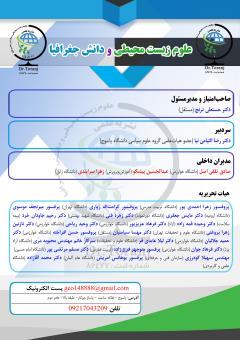بررسی رابطه حمایت اجتماعی با انگ های اجتماعی دبیران دبیرستانهای شهر یاسوج
محورهای موضوعی : علوم اجتماعی
1 - دانشگاه آزاد مروردشت
2 - دانشگاه فرهنگیان یاسوج
کلید واژه: حمایت اجتماعی, انگ های اجتماعی, مشکلات, استرس ,
چکیده مقاله :
به نظر می رسد هرچه فرد حمایت اجتماعی و قدرت بیشتری در انگ های اجتماعی ، مقابله با مشکلات و استرسهای زندگی داشته باشد، کمتر در معرض آشفتگی های روانی و هیجانی قرار میگیرد و از سلامت و بهزیستی روانی بالاتری بهره مند میشود پژوهش حاضر با هدف بررسی رابطه حمایت اجتماعی با انگ های اجتماعی دبیران دبیرستانهای شهر یاسوج شد. روش پژوهش این تحقیق، توصیفی از نوع همبستگی و جامعه آماری شامل همه دبیران دبیرستانهای شهر یاسوج بودند. از جامعه مذکور 100 نفر نمونهگیری از جامعه به شیوه در دسترس و نمونهگیری جامعه بهصورت تصادفی خوشهای انتخاب شد. برای گردآوری دادههای پژوهش از پرسشنامههای پرسشنامه حمایت اجتماعی اداره شده ، پرسشنامه استاندارد استيگماي دروني بيمار رواني استفاده شد و نتایج با استفاده از روشهای آماری ضریب همبستگی و رگرسیون خطی تحلیل و معادلات ساختاری تحلیل شد. یافتههای پژوهش نشان داد، بین حمایت اجتماعی با انگ اجتماعی در دبیران دبیرستانهای شهر یاسوج رابطه مثبت معنیدار وجود دارد.
It seems that the more social support and strength a person has in social stigmas, dealing with life's problems and stresses, the less he is exposed to mental and emotional disturbances and benefits from higher mental health and well-being. The relationship between social support and social stigma among high school teachers in Yasouj city was investigated. The research method of this research was descriptive of the correlation type and the statistical population included all high school teachers in Yasouj city. From the mentioned society, 100 people were selected from the society by the accessible method and the society was selected by cluster random sampling. To collect the research data, questionnaires of social support questionnaire, standard questionnaire of internal stigma of mental patients were used and the results were analyzed using statistical methods of correlation coefficient, linear regression and structural equations. The research findings showed that there is a significant positive relationship between social support and social stigma among high school teachers in Yasouj city.
• سپاه منصور, مزگان, براتی و حسینقلی. (1394). نقش واسطهای مقایسه اجتماعی در رابطه با حمایت اجتماعی ادراک شده والدین و همسالان با مادیگرایی در دانش آموزان دوره متوسطه. دوفصلنامه علمی-پژوهشی شناخت اجتماعی, 4(2), 89-101
• علی پور، احمد (1385)ارتباط حمایت اجتماعی با شاخصهای ایمنی بدن در افراد سالم: بررسی مدل تأثیر کلی. مجله روانپزشکی و روانشناسی بالینی ایران، اندیشه و رفتار12(9) صص 139-134
• غنیمی, فرزانه ، عصمت دانش , دادخواه ، اصغر ، صادق تقی لو (1397) نقش میانجیگر راهبردهای مقابلهای و حمایت اجتماعی ادراک شده در رابطه با استرس ادراک شده و کیفیت زندگی والدین کودکان دچار اختلال طیف اُتیسم. روانشناسی کاربردی. ، ۸(۴ پیاپی ۳۳): ۴۲-۲۹.
• قربانی, جهانی زاده, میربد, سید مهران, امیدی. (1396). بررسی رابطه سرمایههای روانشناختی و اجتماعی با سلامت اجتماعی با توجه به متغیر میانجی حمایت اجتماعی. پژوهش های روانشناسی اجتماعی, 10(38), 83-100.
• وامقی روشنک، امیرعلی اکبری صدیقه، ساجدی فیروزه، سجادی حمیرا، علویمجد حمید، حاجیقاسمعلی سهیلا(1394) مقایسه استرس و حمایت اجتماعی درک شده مادران کودکان ۶ تا ۱۸ ماهه با تأخیر تکاملی و تکامل طبیعی. مجله حیات. . ۲۱ (3) :۷۴-۸۷
• Dabrowska, A., & Pisula, E. (2010). Parenting stress and coping styles in mothers and fathers of pre‐school children with autism and Down syndrome. Journal of Intellectual Disability Research, 54(3), 266-280.
• Galloway, M., Pope, D., & Osberg, J. (2007). Stressed-out students-SOS: Youth perspectives on changing school climates. International Handbook of Student Experience in Elementary and Secondary School, 611–634.
• Ingersoll, B., & Hambrick, D. Z. (2011). The relationship between the broader autism phenotype, child severity, and stress and depression in parents of children with autism spectrum disorders. Research in Autism Spectrum Disorders, 5(1), 337-344.
• Lu, L. (1997). Social Support, Reciprocity, and Weil-Being. The Journal of Social Psychology, 137(5), 618–628.
• Mak, J. L., Byars-Winston, A., & Bakken, L. L. (2008). Coping efficacy and perceived family support:
• Potential factors for reducing stress in premedical students. Medical Education, 42, 572-579.
• Ryan, R. M., & Deci, E. L. (2001). On happiness and human potentials: A review of research on hedonic and eudaimonic well-being. Annual Review of Psychology, 52(1), 141–166.
• Sarafino, E. P., & Smith, T. W. (2014). Health psychology: Biopsychosocial interactions. John Wiley & Sons. Retrieved from https://books.google.com/books?hl=en&lr=&id=ypODBgAAQBAJ&oi=fnd&pg=PR6&dq=sarafino+smith+health+psychology&ots=17jKpP3Dj_&sig=keAz8G5s9RDYLuKOsOXugkE9_Dg
• Smith, L., Webber, R., & DeFrain, J. (2013). Spiritual well-being and its relationship to resilience in young people: A mixed methods case study. Sage Open, 3(2), 2158244013485582.
• Yalçın, İ. (2011). Social support and optimism as predictors of life satisfaction of college students. International Journal for the Advancement of Counselling, 33(2), 79–87.


